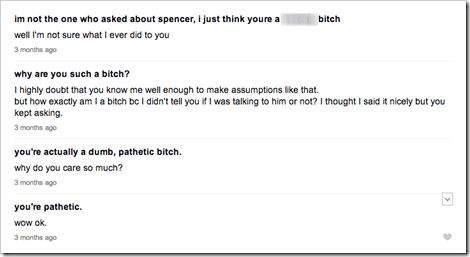Back in 2012, I wrote about some potential dangers surrounding the Instagram and Kik Messenger combination. By now, hopefully many parents know what to look for and how to combat this social danger. Recently, I started to investigate a new social danger for kids, specifically Ask.fm which actually has a few documented teen suicides attributed to the service. Interestingly, it was my teenager and my wife that introduced me to Ask.fm. My teen wanted to join and my wife said absolutely not!
Before I go into this social danger, I do want to point out that I am an avid Instagram user and do like the service. I allow my kids to use it, with some guidance, and my wife and I feel pretty comfortable with how it is being used by them. In both this case (with Ask.fm) and with Kik Messenger, the linkage (literally) is via Instagram. With Kik, many tween and teen Instagram users were putting their Kik Messenger user name in their Instagram profiles or picture messages (e.g., “Kik me at…”). The linkage with Ask.fm is similar – tweens and teens are putting their Ask.fm profile links in their Instagram profile. That’s the only connection with Instagram…it’s a springboard to these other dangerous social sites. But Ask.fm is prevalent in many other social media sites (so just to be clear, I’m not picking on just Instagram).

So what is Ask.fm? It is a social site where users can ask other users questions, and responses are limited to 300 characters. The questions can be from a named user, or completely anonymously asked. It is unmoderated (unless a user reports something), has no parental controls, and is an over-seas company (based in Latvia). If you look at their Terms of Service (TOS), it says “Terms of use are governed by Latvian laws and disputes are solved in Latvian courts.” Now THAT’S comforting.
Update: Be sure to check out my Parents Guide to Social Media Apps used by Kids – published 9/27/14.
The concept seems harmless enough. You register, create a profile, and ask/answer questions that are posted to you. The problem is around the anonymity of the messaging. While in the settings, you do have the ability to block anonymous questions, from what I have seen, most users do not do this. You do have the ability to blacklist users, assuming you know who they are. The TOS does say that you need to be 13 years old or older to join the site, but that is something that I’m sure is bypassed regularly.
Once you create an account, you get a profile URL (e.g., “http://ask.fm/USERNAMEHERE”) and this is the profile URL that many teens and tweens are starting to populate in their Instagram accounts (as well as other social media sites).
Again, this seems relatively harmless, right? WRONG! Ask.fm is rapidly becoming a site for bullies and seemingly sex-crazed users (even if it is simply innuendos in messaging). And I believe that parents (especially in the US) don’t know much about Ask.fm yet. It seems that since this service originally launched in Europe, it had more attraction there initially. Since then it has come overseas to the States.
What The Dangers Might Look Like
What is concerning about Ask.fm? A lot of things, in my opinion. Apart from some of the items that I mentioned above, there is the content itself. While at first glance, much of the content that a user might answer initially looks harmless, and the seeded questions are pretty darn innocent, the longer a user interacts, makes friends, publishes their responses and links to their Ask.fm profile, the more questionable the content becomes.
It can start as innocently as (and these are actual questions):
- What song best describes your day today?
- When you go to amusement parks, what do you like to do the most?
- What did you forget to do today?
- How do successful people differ from unsuccessful ones?
But that is where the innocence seems to end with some accounts and interactions therein. While I’m sure that there are many Ask.fm users and conversations that are completely harmless, it is relatively easy to find examples of where the Q&A process has become quite questionable.
There are comment threads that are quite bullying in nature (e.g., “you are fat/ugly/stupid/[insert insult here]”). The few cases where I have seen those types of comments, most users seems to shrug those off. Sometimes, other users jump to the defense of the bully-ee. A few of these types of mean comments are probably okay. But when they are piled on and repeated over and over, it becomes hateful and damaging.
Here are some random examples I found:



There are also many comments (and answers) that are sexual in nature, as innocently posed as “what color is your underwear?” These get dirty quickly, moving from PG-13 to R to NC-17 and beyond. I won’t go into example of those. While I understand that these kids may be simply “talking the talk” because Ask.fm is anonymous and somewhat “safe” to say what you want, these scenarios can escalate and/or be misinterpreted. “Do you want to have sex?/Sure, name a place and time” threads can turn from a question asked jokingly with a similar response, to something much more serious, especially if the Ask.fm users actually do know each other.
And, as can be expected, Kik Messenger seems to always come into play:


I hope you can see how innocent questions and answers can be turned into something much more scary.
How To Search for the Danger
I’m not going to highlight any users here. I don’t think it is fair, nor do I feel that it is my job to single out anybody. What I will do, however is show you how you can find this dangerous content yourself and check to see if your children or their friends are active on Ask.fm or not.

Probably the easiest way is to simply sign up for a Ask.fm account. Once you are in there, you can use the “Search” function to find people. You can also connect with Facebook or Twitter to see if any of your contacts are there. Ask.fm also has an iOS app. If you set up an account, you can easily search for people directly within the app or connect the app to Twitter or Facebook to see if any of your contacts are on there, much that same way that you can on the web.
Another way to search is with Instagram. If you know your kid’s Instagram user, check to see in their profile if they have a link to Ask.fm there. If they do, click over to it. If you are not on Instagram yourself, or want to search for people, you can use the website called Statigram to search for user names (or tags).
Using the search function in Statigram, you can search for a user name or actually the full name of the person. If you check on your kids, hopefully they will have private Instagram accounts and you won’t be able to see their pictures unless you are connected. If they have public accounts on Instagram, now might be a good chance to review what pictures they are posting (as well as check to see if they have an Ask.fm profile link).
If you want to do a generic test to see what users have Ask.fm in their profile, just do a search on Statigram for “ask.fm”. Then click through a profile and see if they have an Ask.fm link in their profile. Do note, not all Ask.fm profiles show “bad” things, but it doesn’t take too much searching to find some that I would consider to be questionable.
Another way that you can search for Ask.fm links is within Facebook’s search. Just type in “ask.fm” and go to the “Public Posts” section.
What You Can Do to Stop Access
As I wrote about previously, I’m a firm believer in talking with your children about social dangers instead of simply blocking or deleting access. These types of sites are like cockroaches, if you kill one, more come back to replace them. So it is better to teach understanding and prevention than dictate that they simply cannot be used. That is to say, spend time with your children, face to face, explaining and showing your children how evil the bullying can be on these types of sites.
I realize that social bullying or cyber bullying takes place on just about any social network. So, it is critical to work with your children to help them understand why they might not want to participate in online conversations or media sharing. If they are a victim of bullying online, they should feel comfortable asking for help or guidance, and the only way to set up this type of dialog is to ensure that it is open and friendly. You should avoid saying “you cannot use these sites” but rather ask open-ended questions like “why do you want to be on this site” or “how would you respond to this (hypothetical) conversation?”
A two-way dialog is the best way to hopefully limit your child’s access and exposure to these sites. But sometimes you might not be able to have a constructive conversation and you may need to take preventative measures.
There is no way to 100% block access to all these types of sites. But there may be some services like Ask.fm that you may want to consider blocking. Doing this on your child’s mobile phone is practically impossible unfortunately unless you delete the app or manage their installs. Remember, Ask.fm is also web-based and hard to block at the browser-level. If, however, your kids only access social media at home, there are a few things you can do.
Set up Parental Controls. There are plenty of software suites (free and commercial) that you can use. On the Mac, you can set up Parental Controls and simply block website access to the sites that you want (like Ask.fm). If you are on Windows, you could use Microsoft Family Safety to do the same thing (as well as review the logs of your child’s activities).
If you manage your home network (e.g., via a WiFi router), I would suggest using OpenDNS. I won’t go into all of the great capabilities of OpenDNS nor how to set it up, I do want mention that they have a variety of Parental Control services available. You essentially configure your router with the OpenDNS DNS server info, configure your network and parental controls on OpenDNS, and then breath a little easier knowing that you can block sites as well as get access to activity logs in your home network.
Have the Conversation with your Children
I have found that many parents are simply unaware of what their kids do on social media, either because they simply don’t know about it or their kids don’t talk to them about it. Personally, I think if used appropriately, social media can actually be ok for kids, but only if used safely and properly and with the guidance of adults. Whenever a person of authority says to a teen or tween that they can’t do something, the immediate, natural reaction of the child is to find out more about it. Children are curious, they want to experiment. They want to test their boundaries. They want to explore. They want to be social with their peers. They want to be the first kid on the block to try something new and be “cool” in the process.
As parents, we don’t want to stifle this curiosity or creativity. This is how they learn and grow. But, we do need to be protective and provide help along their journey. Though conversations with my kids, we have together decided that Instagram, for example, is ok, but only if used in certain ways. Kik Messenger and Ask.fm, however, we have decided together, is not ok. But we only came to this decision jointly, by showing examples of what is bad and talking about the examples that we saw.
If you made it all the way to the end of this article, it shows me that either as a parent or as a child, you are curious to learn more and to understand the good and bad sides of social media. Parents, I do ask that before you block access or deny a child from accessing certain apps or sites, that you have the conversation with your children PRIOR to doing this and explain to them why you feel you need to so this. Be sure to understand and listen to why your kids might want to do it. They may have very legitimate reasons and if they still insist in participating in a site like Ask.fm, ask them if you can monitor what they do or say and coach them (not that you might be an expert). You do, however, have life experience and understand (hopefully) what some decisions can make on a child’s life and future.
Have you spoken with your kids about social media? The next time that you have one-on-one time with them, do try to approach the subject. You might be amazed at what they have to say.
If you have any experiences you want to share, be sure to leave a comment.
HTD says: Working to have an open dialog with your kids is crucial in this day and age of social media. Do it!




30 comments
Baron WTS
Thanks for sharing this new for ask.fm ….. http://www.customercare-email.com
Jhone Smith
Facebook Help Support :- http://www.customercare-email.com/facebook-customer-service.html
Maria
I am a teen, I use both Ask.fm and Instagram but there’s one thing that was NOT mentioned about Ask.fm. That thing is that you can change your profile setting on Ask to: NOT ALLOW ANONYMOUS QUESTIONS. When you do that, anyone that asks you a question their name will pop-up and you will be able to block them. I was one of those kids that got bullied in Ask, but after I changed my settings no one ever bugged me again. That’s everything that I have to say and thanks.
jim
https://www.hightechdad.com/2013/06/05/parents-be-warned-ask-fm-is-a-dangerous-deadly-social-site-for-teens-tweens/#comments
anon
I do agree with this, it is a source of bullying.
However, you need to give your teens space. How can they learn if you don’t let them? They can stand up for themselves, they don’t need someone watching their every move. Over protectiveness has been proven to give teens depression too, so not really the best idea there ;).
Amy
I have ask.fm and I’ve only ever had positive things said about myself, and even if I got nastiness I’d just close my laptop anyways haha, some people can b so silly
Luce
I’ve had nasty things said to me by a 50 year old. I was more mature and im 14! They are either pretending to be over 15 or really inmature.
Alwebdewf
blah
dodo
Lets be real, we all have very nasty thoughts about people sometimes, things that could hurt you psychologically alot. You can just say these things to those people anonymously through ask fm. Yes you can do that in other ways as well, but ask fm basically has everything ready for you, all you need to do is type in the box, and press the button.
Anon
My friend is currently being cyber bullied on ask, so it is real… it happens. The person just wont stop and its so annoying.
Name
I’m a teen, and honestly, I don’t agree, yet I don’t disagree with you. What I mean is, my friends and I always see little kids on social networks and whenever this comes up, we remember that we had coloring books/art sets/scooters. What ever happened to having friends over just to talk/play out side?! You should really talk about this…and when i say little kids; I mean like even middle school kids too. (I’m in my third year of high school). Some of you may think this includes me, but honestly, I ONLY have a ask.fm account…that’s pretty good if you ask me…I mean, it’s not like I post anything rude/insulting/just-plain-gross. Besides, I rarely go on…like once a month…thanks for making this post!!! I also agree that these sites can be dangerous in the wrong hands. I disagree because it’s their choice…if they want to be at risk…go ahead…but parents REALLY need to supervise their child(-ren)…okay…I’m done “ranting”. Thanks for reading!
Camille. Not Ginger.
Really, there is no good reason for a teenager to be using ask.fm. Most of the usage I see from it is people on twitter asking each other questions, which is fun if you have a ‘public twitter account’ (ie my slang for a twitter account where you let anyone follow you, but you generally don’t post your name, photos of yourself, etc). If someone you really knew wanted to ask you a question, I don’t see why they would need to use ask.fm to do it.
Amy
well, ask fm can boost peoples confidence, people are only looking at the negatives, and not the positives!!!
Lucy
Hi. I’m a teen who actually had ask.fm. I was told by my best friend that ask.fm was sketchy. I too use Instagram and other social apps. When she told me it was sketchy, I didn’t really believe her, so I got the idea to go online to check out what other stuff was said about it. This article, by far, was the best one and easiest to understand. I didn’t receive any hate when I had ask.fm, but I really saw a lot of it. I also saw a lot of sexual stuff being sent to people. I also did not receive any of that. So I just never worried about it. I was very lucky. Thanks high tech dad. You really changed my thoughts about ask.fm. Before I was unsure, but now it’s clear. :)
Andris Jansons
I also like the always noticeable ”it’s an overseas company”… Americans sure love this expression to create a negative image, as if it’s overseas then it’s definitely no good for a God fearing rifle carrying American. As i said, never been on the ask.fm site and don’t have any positive things to say about it. Good luck fighting it. But I hate when people make half assed comments about places they’ve never been to.
And anyways, the problem’s not kids roaming free on intenet. The problem’s parents who don’t educate their children enough. When I grew up in 90s Latvia (which was way worse than Western world now and even way worse than Latvia in 2013) there was no ask.fm, instagram etc. but there were bullies, drugs, alcohol etc. I certainly doubt that an anonymous commenter on the internet is a worse bully than one you have at school and I’d even say that anonymity on the net is something to be preserved (for adult sites), since it’s a good way for psychos and idiots to let off steam. If we make all people be PC all the time, the crazies will just snap one day and go to a school with a gun that already happens in PC-heavy USA.
hightechdad
My only comment about ask.fm being an overseas company was that it is often more difficult to ask for better privacy or parental controls than if the site were US based.
Andris Jansons
Now THAT’S comforting
————————-
What’s comforting is that some guy who knows nothing about Latvia comes here and comments on Latvian law. Yes, I’m from Latvia although I don’t support ask.fm in the form as it is at the moment and I believe the Russian dynamic due who created the site (with homophobic and Stalinist views) should be kept on a short leash.
But I don’t see where’s the problem with Latvian law? Do you know Latvian law, have you even been to Latvia? Latvia is a EU member and its laws are harmonised to be in line with the EU laws. Granted, Latvia is a small country in Eastern Europe and is not one of the richest ones but it’s not exactly an African dictatorship or Mexico….
Latvia’s intentional homicide rate – 3.1 murders per 100 000 people
USA – 4.8 murders per 100 000 people
Mexico – 23.7……
tmmvol
Thanks, HighTechDad. These are great articles. Unfortunately, I am trying to print for my dh and it is 140+ pages!!! Do you have printer-friendly versions of your articles?
hightechdad
Thanks for letting me know about that. I have just added a plug-in (Print Friendly) which makes printing a bit easier. Just look for the green button at the end of the article.
Tony
Ironically, the responses you are getting from the kids here is exactly why these sites are so dangerous. They simply do not understand the kind of trouble they are exposing themselves to. This is no different than shielding them from other hazards such as drugs and alcohol and it’s our responsibility as parents to talk to them about it. This is not about “getting all up ” in their faces. It’s about educating kids about things that we know can get them hurt. We need to start by letting them know that we are doing it because we love them and want only the best for them. I will never stop trying to protect my kids for as long as they live, despite whether they think I am “up all in their face” or not. That is the sign of a good, responsible, and loving parent. It’s saddens me to know that not all parents feel the same.
soozyj
Ignore the negative comments, techdad, I found the information to be alarming and helpful. I think you’re a great dad.
:P
Wow. You would be the worst dad ever. Screw you.
Stop getting all up in your kids business, and just let them live life.
Essence Yvette Davis
exactly
Ameliah
I’d despise having a dad like you. I don’t mean that in a bad way, but I’m glad my parents aren’t all up in my business. I take care of myself. I mean, if someone tries to bully me, I can stand up for myself. It’s not that hard, you know.
Essence Yvette Davis
I know right!
concerned teen
Have you heard about/written about the Vine app? If not, I suggest you look into it. I didn’t think it was any harm but a few days ago some random people followed me. I realized I didn’t want strangers seeing me and hearing my voice. You can block users, but there is no way to turn your account private. i deleted the app.
hightechdad
Yes, I know about Vine. I uses it as does my oldest daughter and my wife. Thus far, I have found it relatively harmless. But I always keep my eye on different popular apps. Thanks for the comment.
KarasMom.
Thanks. Any extra info is always appreciated when raising kids weather we think we are a pro at it or not. For any negative feedback you ever get from others is a clear sign they don’t have children of their own OR they simply don’t care about what their kids are doing and if that’s the case….they shouldn’t of had had them. Thanks Tech dad for caring.
Daan
So, how is this different from the rest of the internets?
hightechdad
Well, for starters, it promotes the idea of posting questions (or having conversations) anonymously. In most other social sites, you at least have a user-name or are a named-individual. (But yes, there are several other sites that are similar).